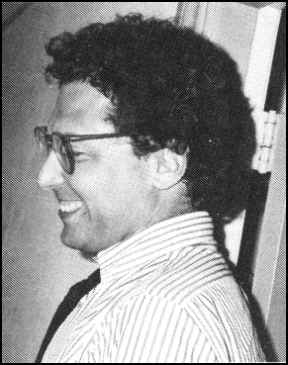
 |
Jacob Epstein by Jo Cooper April 1986 |
|
Jacob Epstein, Executive Story Editor for Hill Street Blues, is a young man who has made it to the top in a hurry.
Before he graduated from Yale in 1978, he had received the Curtiss Prize for Literary Excellence, sold magazine articles, and had his first novel published. By 1984 he was on staff
at MTM (Mary Tyler Moore) Productions. Epstein, who was nominated for an Emmy Award for his solo-teleplay episode of Hill Street blues, talked with Jo Cooper at a
writers' conference. Jo Cooper: What career path led you to your current position? Jacob Epstein: When I was working on a magazine article about a drug trial, I took a college friend to the criminal proceedings. She told her husband, David Milch, one of the head writers of Hill Street Blues. He called me and asked me to fly out to Los Angeles and write a freelance script for the show. I was broke, and my magazine article had been bounced when the editor there was replaced, so the offer was like an early Christmas. I came out and developed the script outline with Steven Bochco, Jeffrey Lewis,and David Milch. After many drafts and rewriting, it was aired. How is the work of a TV script editor different from that of the editor of a magazine? Epstein: A TV editor isn't really an editor; he's a writer and rewriter. Most of our freelance scripts need to be completely rewritten. This is not because they're badly written, but because only the six in-house writers know the show's formula, the story, and how an episode should be synchronized with what has aired previously and what will air subsequently. Jo Cooper:The rules for writing for Hill Street are, as far as I know, very different from the rules for other kinds of television writing. Our show is good at teaching you how to write economical scenes that have no windup, by which I mean, you cut in deep into the action, with no preamble. You stay very close to the plot, and this has been good for me because it takes real discipline to stick closely to your story and not wander off. Each of our scripts takes place in a single day, in a community which is modeled on Harlem in New York City, but is really a fictitious place. You can almost draw a chart that organizes the material. The show has a flexible but very clear structure, or formula, as action moves from the street to the squad room, then back to the street; i-out, in-out. The trick to the rewriting is to take all the pieces of a freelance script and funnel them into this pattern and unify the emotional attitides and physical requirements with our characters. To what extent do you write and rewrite the Hill street scripts? Epstein: I write parts of every script, as does virtually every one of the six writers here. My participation varies from working on first drafts to working on succesive and final drafts, which are called polishes. We begin plottong our episodes around late April, and it's mid-March of the next year before we finish the twenty-two episodes of the season. We usually take two to three weeks to write an episode, with as many as six writers working on a first draft, dwindling to one or two working to get the script through the nedt five, six, and sometimes seven drafts before production. Each Hill Street episode tells four or five separate stories at a time. One is the central, or mudular story--a police story, usually involving Captain Furillo. Another one is usually a comic, somewhat lighter story, to provide sweeter roles against the basso profundo of city-wide mayhem. Is TV script writing more demanding than the other writing you've done? Epstein: At first, yes, because you can't rely on narrative to promote the action, but once you've done it a while there are shortcuts. There are certain kinds of scenes we've done over and over. They look different on the screen because the contedt is different, but once you've mastered the technique for, say, a chase, or a hostage siege, or a squad room scene, you know how to do similar scenes the next time. This doesn't mean you're recycling old material--you're bringing your best work to any particular scene--but there ar professional tricks which help. The hard part is learning the vocabulary, learning how to write with such economyk, and leanign to write for fourteen distinct characters, in short, it's hard, but all writing, if it's any good, is difficult. Did any one person influence your writing career? Epstein: Not really. Writing was what I was good at in school. I did have an excellent English teacher in the 9th grade, Rodney Marriott, who excited me and taught me more about writing than anyone else. When I was in school, my stories were often read aloud in class, so ti was a form of showing off. I tried hard to write something good that would be read aloud. Because my parents were editors, I met many writers when i was growing up. I realized there was no great mystery about writing, ordinary people could do it. Do you have any suggestions for young people interested in writing for TV? Epstein: If you have a movie camera, actors, and some money, make a movie and write the screenplay. Otherwise, screenplay work is not the place to start, because it's not the way a writer will find his or her own voice, and a voice is what's most important. The best advice is simply to WRITE! Write fiction, plays, jounalism. learn to write fluently, carefully, fast, and about things that concern you. Become a good writer first. Writing for TV may come later. |
by Ralph Cooper, 12-23-07 |


|